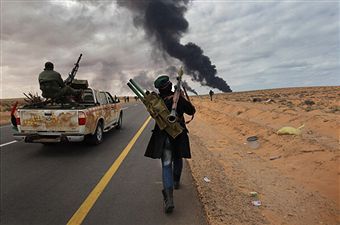 The multiple crises in North Africa, from the revolution in Tunisia, through the
protests in Egypt and to the conflict in Libya, has reinvigorated British foreign policy. In the last couple of years classic international issues have been pushed to the side by a need to focus on
economic statecraft. Foreign ministers became less important as finance ministers gained prominence. This will now change, as leaders shift their focus onto the Libya crisis. The UN is again in
focus, not the G20.
The multiple crises in North Africa, from the revolution in Tunisia, through the
protests in Egypt and to the conflict in Libya, has reinvigorated British foreign policy. In the last couple of years classic international issues have been pushed to the side by a need to focus on
economic statecraft. Foreign ministers became less important as finance ministers gained prominence. This will now change, as leaders shift their focus onto the Libya crisis. The UN is again in
focus, not the G20.
The second change may be on East/West dynamics. Before the crisis, the air was thick with talk of a multipolar world and how power was flowing roughly from the West to the emerging powers of the East; and how international politics would be shaped by the preferences of China, Russia, India and Brazil. After the crisis, things look a little different. Though the US has played a limited role in Tunisia and Libya (but a larger, behind-the-scenes one in Egypt), everyone, from protesters to power-brokers, are still looking to see what the US administration will do. Look how the media judged David Cameron’s no-fly zone idea on the basis of what US policy-makers thought.
If the US looks larger today, China looks smaller. The Chinese government has emerged from the crisis chastised, having realising how they struggled to defend their citizens abroad, despite having expanded its military. The result has been an acquiescence in the West’s demands at the UN. This may not last, but China looks smaller today than it did yesterday.
The most important change, however, is the “return” of democracy to the international agenda. It had languished for years in the post-Iraq doldrums, put there by the neo-realistic leaders like Barack Obama to David Cameron embraced. Downing Street people talk about the importance of democracy-promotion with a gusto that was not heard previously. That will not lapse quickly.
European countries are debating the merits of backing Tunisia’s Ben Ali or Egypt’s Hosni Mubarak and soft-pedalling democracy-promotion. They may, as they have done before, choose to back strongmen; but they will never go back to one-sided support of the past. Even DfiD will have to look again at whether UK’s aid is going to too many places seen as “unfree”. Some have argued that the protests are not so much Western as post-Western. They are partly nationalist, wholly indigenous and, unlike those in late 1980s, not aimed at having countries “join” Europe. But I don’t think this matters. These people want what we have in the West, even if they don’t want to join us like the Poles did.
This also has implications for China, where the fear of a copycat revolution is extremely high. If one takes place, and succeeds, it will change China forever. But more likely, if one begins and is violently repressed, then a rupture between the West and China will ensue, with serious implication for the world’s economic future.
The fourth set of implications concern energy. If Algeria, upon which Spain and Italy rely for energy, looks like it could go the way of Libya, or if problems begin in Saudi Arabia, then the effect in Europe will probably be like that of the “oil shock” of the 1970s. It will lead to new investments in energy efficiency, bio-fuels, and any other way in which Europe can become less dependent on fossil fuels and the Middle East.
Finally, the crisis has a number of implications for Europe. The obvious one has been to display how the post-Lisbon set-up has done little to improve coordination among EU actors. Cathy Ashton’s reputation has sunk to extraordinary depths.






Comments